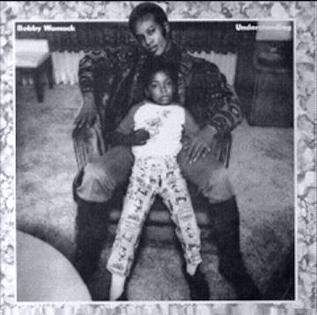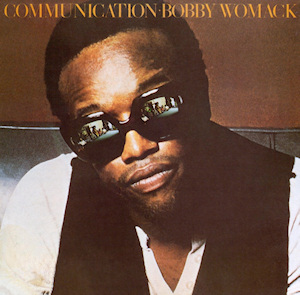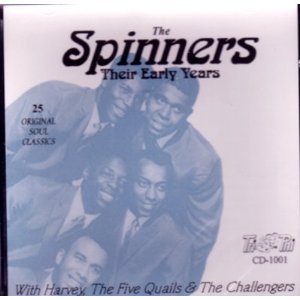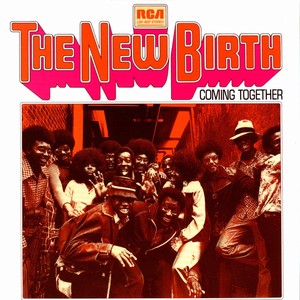
The Moonglows were an American R&B group in the 1950s. Their song "Sincerely" went to number 1 on the Billboard R&B chart and number 20 on the Billboard Juke Box chart.

Robert Dwayne Womack was an American singer, songwriter, musician, and record producer. Starting in the early 1950s as the lead singer of his family musical group the Valentinos and as Sam Cooke's backing guitarist, Womack's career spanned more than 60 years and multiple styles, including R&B, jazz, soul, rock and roll, doo-wop, and gospel.

United is a studio album by soul musicians Marvin Gaye and Tammi Terrell, released August 29, 1967 on the Motown-subsidiary label Tamla Records. Harvey Fuqua and Johnny Bristol produced all of the tracks on the album, with the exception of "You Got What It Takes" and "Oh How I'd Miss You". Fuqua and Bristol produced "Hold Me Oh My Darling" and "Two Can Have a Party" as Tammi Terrell solo tracks in 1965 and 1966, and had Gaye overdub his vocals to them in order to create duet versions of the songs.

Love Child is the fifteenth studio album released by Diana Ross & the Supremes for the Motown label in 1968. The LP was the group's first studio LP not to include any songs written or produced by any member of the Holland–Dozier–Holland production team, who had previously overseen most of the Supremes' releases.
"I'm in Love" is a song written by Bobby Womack. It was first recorded by Wilson Pickett in 1967, which gave him a top-ten R&B hit on Billboard's chart in 1968, peaking at number 4 as well as peaking at number 45 on the Billboard Hot 100.

Dynamite is the third and last collaborative album between labelmates The Supremes and The Four Tops, released on the Motown label in 1971. The album was a collection of material recorded for the Magnificent Seven albums, but which had not been included on either of those two albums. The cover artwork was an illustration based on photo sessions from the Return of the Magnificent Seven album artwork. In the US, Dynamite was as commercially unsuccessful as The Magnificent 7 (1970) and The Return of the Magnificent Seven (1971), peaking at the lower hundreds of the Billboard Top 200. The album fared much better on the Billboard R&B charts, peaking at 21.
New Birth is an American funk and R&B group. It was originally conceived in Detroit, Michigan by former Motown songwriter/producer, Vernon Bullock and co-founded in Louisville, Kentucky by him with former singer and Motown songwriter/producer Harvey Fuqua and musicians, Tony Churchill, James Baker, Robin Russell, Austin Lander, Robert "Lurch" Jackson, Leroy Taylor, Charlie Hearndon, Bruce Marshall and Nathaniel "Nebs" Neblett (1946–2016).

Understanding is the fourth studio album by American musician Bobby Womack. The album was released on March 30, 1972, by United Artists Records. Womack recorded Understanding in Memphis, Tennessee at American Sound Studio and in Muscle Shoals Sound Studios in Muscle Shoals, Alabama. At Muscle Shoals, he utilized top session players, including drummer Roger Hawkins, guitarists Jimmy Johnson and Tippy Armstrong, bassist David Hood and keyboardist Barry Beckett.

Communication is the third studio album by American musician Bobby Womack. The album was released on September 15, 1971, by United Artists Records. It reached No. 5 on the Billboard R&B chart and No. 20 on the Billboard Jazz Chart in 1972. It included the hit single, "That's The Way I Feel About Cha", which charted at No. 2 on the Billboard R&B Singles chart and No. 27 on the Billboard pop chart. The album became Womack's breakthrough spawning the hit single "That's The Way I Feel About Cha" and a favorite Womack album track, "(If You Don't Want My Love) Give It Back", which Womack recorded three times after the original, the first remake, a slower acoustic version, was issued on the soundtrack of the film, Across 110th Street, and an instrumental by J. J. Johnson's band. The fourth time Womack recorded it was with Rolling Stones singer and musician Ron Wood. Womack recorded his own versions of James Taylor's "Fire and Rain", Ray Stevens' "Everything Is Beautiful" and featured a spoken word monologue in his cover of the Burt Bacharach and Hal David standard, "(They Long To Be) Close to You".
"Woman's Gotta Have It" is a song written by Darryl Carter, Bobby Womack and Linda Womack. The song was recorded at American Sound Studio in Memphis, Tennessee.
"I Can Understand It" is a soul classic written and originally recorded by rhythm and blues musician Bobby Womack, who originally recorded the song for his top ten album, Understanding, released in late 1972. The Womack version was done in a more blues style.
The Valentinos was an American family R&B group from Cleveland, Ohio, best known for launching the careers of brothers Bobby Womack and Cecil Womack. Bobby went on to find greater fame as a solo artist while Cecil became successful as a member of the husband and wife duo of Womack & Womack with Linda Cooke. The group was well known for R&B hits such as the original versions of "Lookin' for a Love", notably covered by the J. Geils Band and later a solo hit for Bobby Womack, and "It's All Over Now", covered by the Rolling Stones.

"Until It's Time for You to Go" is a song from the 1965 album Many a Mile by Canadian singer-songwriter Buffy Sainte-Marie. Sainte-Marie included a French-language reworking of the song, "T'es pas un autre", on her 1967 album Fire & Fleet & Candlelight. French translation was made by Quebecer songwriter Claude Gauthier.

The Return of The Marvelettes was marketed as the last album by the group, although in reality their last had been 1969's In Full Bloom. It was originally recorded to launch the solo career of former Marvelette Wanda Young, and was produced by Smokey Robinson.
"That's What Girls Are Made For" is the debuting single for the American R&B/Soul vocal group The Spinners, released on Harvey Fuqua's Tri-Phi Records label in 1961.

The Spinners: Their Early Years is a compilation album featuring The Spinners and other various artist that were signed to the Tri-Phi Records/Harvey Records label(s) from 1961 to 1963. It contains the five singles that the group made while signed at Tri-Phi, and a few tracks where they sang backing vocals for other acts on both labels. The album also contains songs performed by various other acts that didn't make the transition to Motown.

The New Birth is the debut album by the American R&B and funk band New Birth. It was released on November 1, 1970 in North America by RCA and produced by mentor Harvey Fuqua, whose style of building a whole song around a simple phrase is represented by "The Unh Song", and his uncredited assistant Vernon Bullock.

Ain't No Big Thing, But It's Growing is the second album by American funk and R&B collective New Birth, released on July 17, 1971, in North America by RCA.

Coming Together is the third album by American funk and R&B collective New Birth, released in March 1972 by RCA.

Harvey Fuqua was an American rhythm and blues singer, songwriter, record producer, and record label executive.














